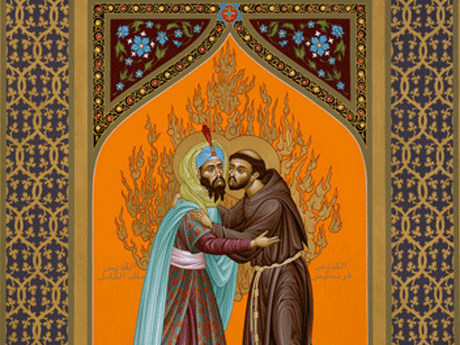
800 years ago, Francis of Assisi travelled to Egypt to meet the Sultan Malek al-Kamil while Christian and Muslim armies fought in the Fifth Crusade, which had been called by Pope Innocent III in 2017. Francis had experienced war and had subsequently renounced his wealth and status. He was now a humble friar preaching peace in the midst of the violence. The Egyptian city of Damietta was under siege. Francis crossed the enemy lines and asked to meet the Sultan. He did not want to broker peace; rather he sought to convert the Sultan or, more likely, be made a martyr in that attempt.
Al-Kamil was a Sufi and a man who had been seeking peace for years. Francis greeted the Sultan saying ‘Peace Be Upon You’, much like the Muslim ‘Assalaam o Aleikum’, which may have prompted the Sultan to give hospitality to Francis and brother Illuminato instead of killing them. The encounter changed Francis profoundly. It is a beautiful story of welcoming the Other, the one that is supposed to be the enemy or at least a stranger, and becomes a friend through hospitality. At its core is a deep spirituality both men had, something that is wholly absent in David J. Britton’s play Kamil and Francis.
In Kamil and Francis, the two men interpreted respectively by Simon Armstrong and Russell Gomer exchange light banter in heaven over a game of table football, too often behaving like 21st century football fans. The gimmick affords a few laughs but fails to capture the personality of both Francis and al-Kamil. The story is told mainly by Sister Placida (Katherine Weare) and Kamil’s interpreter Alhikma (Ri Richards), who speak directly to the audience inundating us with information.
Kamil comes across as petty complaining about being forgotten by the history books due to his ceding of Jerusalem for peace with Christian crusaders, perhaps a clumsy attempt referring to the contemporary situation in the Middle East. The numerous humourous allusions to psychoanalytical notions, wrongly attributed to the 21st century, soon become irksome. The anachronistic take contributes to making the protagonists and the encounter more distant and obscure. Before us are not Francis and Kamil, but two uninspired and uninspiring men. The jokes sometimes weigh down the piece. At one point, Kamil’s interpreter jokes that brother Illuminato is discovering Middle Eastern cuisine, superior to the Italian cuisine of the time, which lacked tomatoes and spaghetti. In such a pedantic text, one would expect the author to know that in the 13th century Italian nobles delighted in the cuisine of the East and that only with the Renaissance ‘eat local’ came into fashion.
All the cast do their best to infuse some life into a pedantic play and to convey emotions battling an emotionless text. They are committed and manage to salvage the story. It is a story that should be told, but one that requires a good ear for the earthy spirituality of Francis and the transcendent faith of Kamil.
Kamil and Francis, produced by Theatr Cadair, premiered at the Royal Welsh College of Music and Drama, Cardiff, Wales on the 27th and 29th of September 2019.
